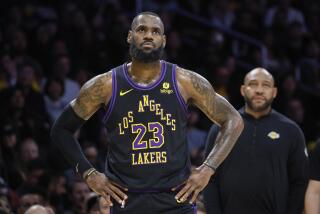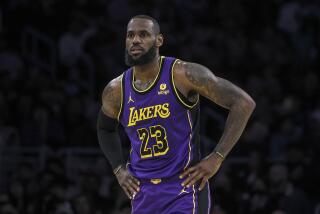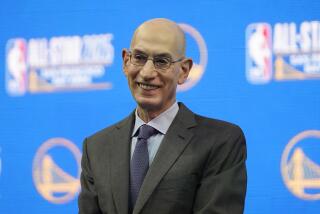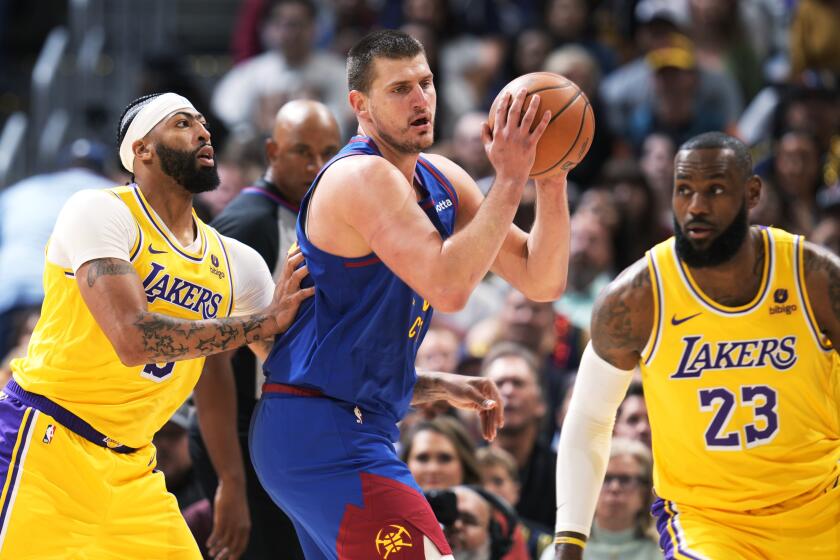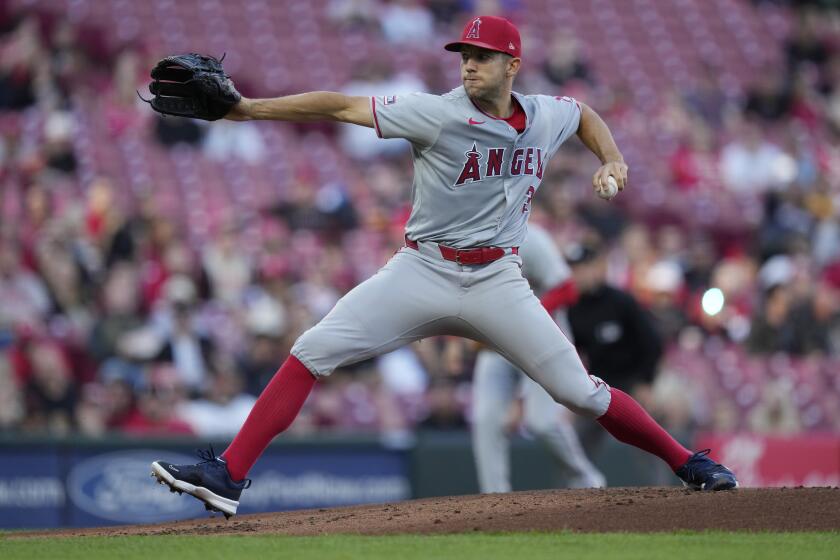David Stern, a real league leader
Commissioner is a title far too limiting for David Stern.
He has been part comedian, part dictator, part visionary, part man on a mission, and there’s nothing Ron Artest’s fists, Gilbert Arenas’ guns or Allen Iverson’s wardrobe could possibly do to stop him.
In his 30 years as the NBA’s top boss, which will end with his Feb. 1 retirement, Stern has shown he almost always knows what he’s doing. One of his first acts as commissioner in the summer of 1984 was to try to terminate the Clippers’ franchise after it moved from San Diego to Los Angeles without league approval.
His efforts failed, of course, but he made up for it more than two decades later by essentially giving the team Chris Paul.
Stern has his reasons, basketball and otherwise, and they’ve usually proved to make sense for a league with top franchises valued at more than $1 billion.
Along the way to building a global empire, Stern gave the impression he was having as much fun as any superstar player or courtside superfan.
Stern has traded barbs with TV personality Jim Rome, elicited laughter from booing draft-day crowds and entertained millions by appearing in an ESPN commercial alongside Tracy McGrady and Wally Szczerbiak.
In the ad, former ESPN anchor Dan Patrick bangs on the bathroom door of a house he presumably shares with McGrady, waiting for him to wrap things up. When McGrady exits and Patrick chides him for lingering, Szczerbiak slips into the bathroom and Patrick is left to dryly tell an approaching Stern, toothbrush in hand, that “there’s a line.”
As silly as it may have seemed at the time, Stern holding a toothbrush was every bit as important to the NBA’s success as Magic Johnson leading a fastbreak or Michael Jordan rising for a game-winning jumper.
Stern merged the realms of entertainment and sports like no commissioner before him, often blurring the lines to fans’ delight. Paradoxically, it seemed, he also instituted a dress code for players that made the game more palatable to corporate types who pay $50 for valet parking. And he got tough with perceived thugs such as Artest and Arenas, handing down lengthy suspensions amid their indiscretions in the name of image control.
Somehow, it all worked. Tremendously.
“He deserves a lot of credit for leading us through the great recession, a period where we had some player image problems, some franchise turnover,” Dallas Mavericks owner Mark Cuban wrote in an email. “Those were not easy things to overcome and his leadership was key to putting the NBA in a position where I believe that in the near future every franchise will have a billion-dollar-plus valuation.”
It’s getting there quickly. According to Forbes, the average NBA franchise is worth $634 million, up 25% from last year, with the New York Knicks valued at a league-high $1.4 billion and the Lakers a close second at $1.35 billion.
Contrast that with 1984, when Forbes estimated that the league’s then-23 teams were worth a combined $400 million in Stern’s first year on the job. At the time, the league was only a few years removed from Finals games being shown on tape delay.
Now regular-season games are broadcast live in 215 countries, and the NBA’s 1,200 employees (up from 24 in Stern’s first year) reside in 15 offices spread over a dozen countries.
The league featured a record 92 international players on its opening-night rosters and even mid-level players such as the Lakers’ Nick Young are now widely recognized abroad, as evidenced by a Chinese fan yelling his nickname during a preseason trip to Shanghai.
Things have changed just a bit from 1978, when Mitch Kupchak traveled to Tel Aviv as a member of the defending NBA champion Washington Bullets.
“You were just another tall person,” recalled Kupchak, now Lakers general manager. “You kind of had to reintroduce yourself and say who you were, where you were from, that you were from the Washington Bullets.
“You walk around with a Lakers jersey on now and anyone knows who you are in this world.”
Stern has long known what it’s like to be recognized, even before becoming the longest-serving commissioner in major U.S. pro sports. He was a familiar face throughout NBA front offices after negotiating the first salary cap and helping to formulate a landmark drug-testing policy as league counsel in the early 1980s under Commissioner Larry O’Brien.
Stern showed a gift for building consensus, often by tearing others’ arguments apart.
“If the general managers are on one side of the discussion, he’ll take the other side just to provoke conversation,” Kupchak said. “You don’t know which side of the conversation he’s on until he’s done, and then he’ll say, ‘Well, I’m on your side, I just wanted to hear your argument.’ ”
There were other times Stern could be just as divisive.
He stubbornly defended the use of a microfiber basketball that cut players’ hands before finally relenting two months into the 2006-07 season, and he famously vetoed the trade that would have sent star point guard Paul to the Lakers in 2011.
Kupchak told season-ticket holders in November that he had not forgiven Stern for the Paul decision, but he declined to address the topic last week. “It’s gone. It’s over,” Kupchak said. “I’ve moved on. There’s nothing to say. Don’t have time.”
Stern also displayed an antagonistic side during two lockouts that forced the cancellation of 48 games per team but resulted in several important victories for owners, including a cap on player salaries and a significant reduction in the players’ share of basketball-related income.
“I had many moments with him during union meetings, during lockouts, where he could be just ruthless,” said Steve Kerr, the former guard who was a players union representative for the Chicago Bulls. “He’s one of those people who was a huge presence and great intelligence and a great command over people and circumstance.”
In what was expected to be his final media conference as commissioner this month, Stern, 71, repeatedly poked fun at his successor, deputy commissioner Adam Silver.
When Silver said he anticipated soliciting advice from Stern, his boss told him what to expect upon calling. “It’s going to busy,” Stern said. “A busy signal.”
That might be a first for Stern, who has made a habit of being there when needed for the last three decades.
“I think he’s going to go down as probably the greatest commissioner ever in sports,” said Kerr, now an analyst for TNT, “when you consider where the league was when he took over, the way he marketed the league and capitalized on the popularity of Magic and Larry [Bird] and Michael and figured out how it should all work in terms of TV contracts and salary caps and marketing.
“He seemed to be ahead of his time before the age of social media. It just felt like the NBA was always sort of two steps ahead of everybody, and I think David Stern has everything to do with that.”
To his legion of fans and detractors alike, he was the commissioner who will be remembered as so much more.
Twitter: @latbbolch
More to Read
Get our high school sports newsletter
Prep Rally is devoted to the SoCal high school sports experience, bringing you scores, stories and a behind-the-scenes look at what makes prep sports so popular.
You may occasionally receive promotional content from the Los Angeles Times.
